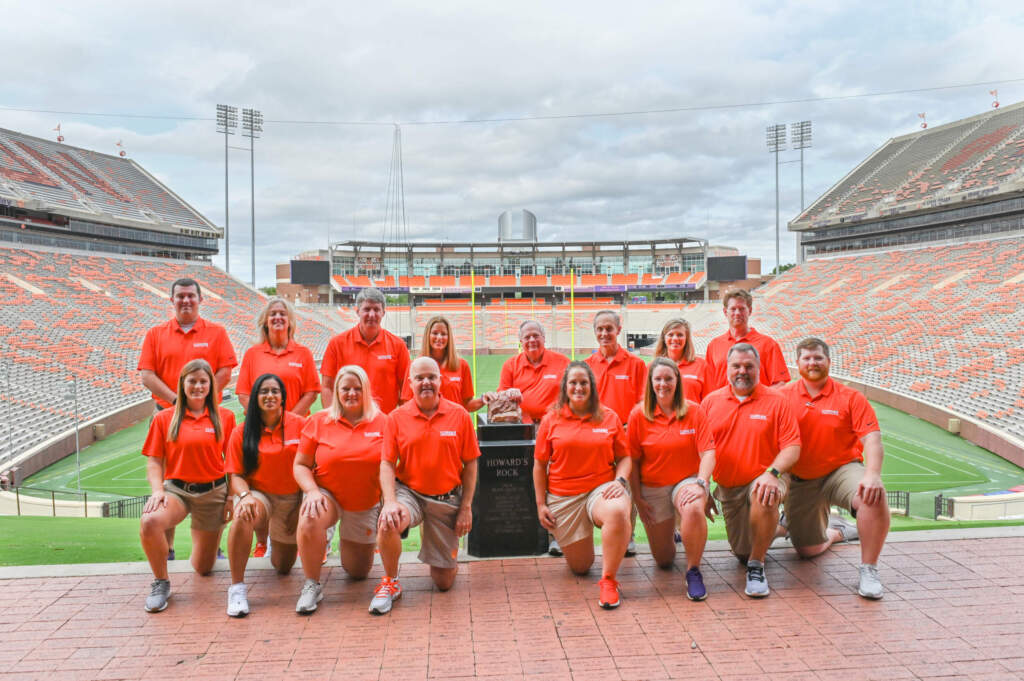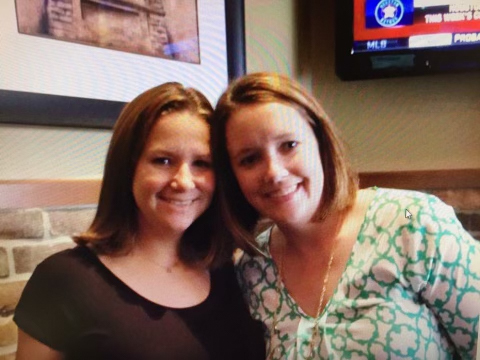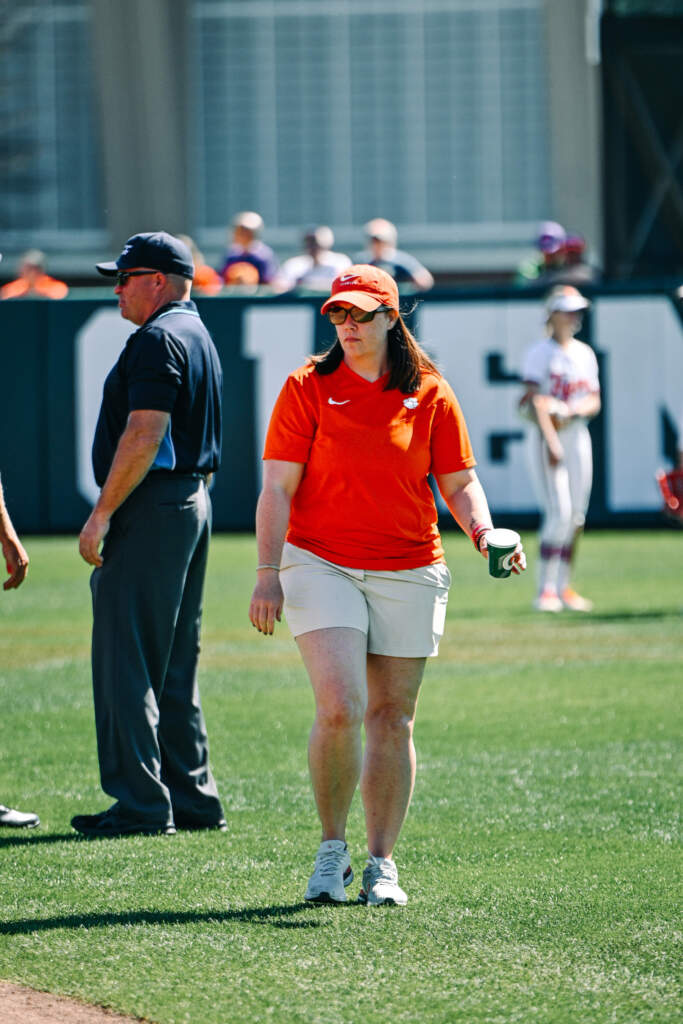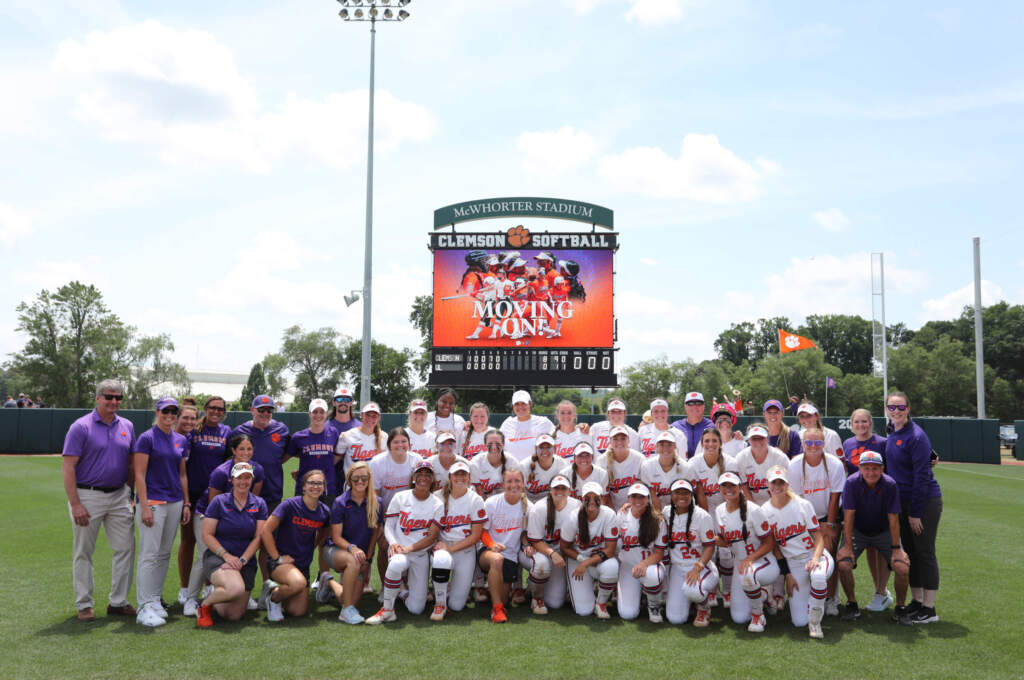When people arrive at McWhorter Stadium to catch a home softball game on any given night, people expect to hear the names of the 2023 roster including the coaching staff. It’s a normal pregame activity that comes with the territory of hosting a game. One name that is often overlooked belongs to an integral part of the program, Clemson softball’s athletic trainer Katie Rovtar. With March being National Athletic Training Month, we want to take a moment to shine a light on someone who shines behind the scenes of the team.
From an early age, Katie was surrounded by sports. Both of her parents were coaches, with her father coaching wrestling. She grew up around wrestling mats and spent Fridays and Saturdays at sporting events. One of her earliest memories around athletics was an injury that occurred during a wrestling match. Jeff Hill, a wrestler on her dad’s team, dislocated his elbow on the mat. Katie watched in amazement as the team doctor relocated the joint, taped it up, and sent Hill back out to wrestle.
This experience sparked Katie’s interest in the medical field. She was fascinated by the athletic trainer who was present at her high school, and after taking quizzes in school about what career she should pursue, she settled on the medical field. She went on to earn her undergraduate degree in Athletic Training from the University of Toledo and her graduate degree from Virginia Tech.
While in school, Katie had several influential mentors. Brian Jones, the head athletic trainer at Toledo, was always approachable and encouraged a positive learning environment. Dr. Rankin, one of her professors, helped her find clinical assignments and pursue her goal of working in collegiate sports. Mike Goforth, the head athletic trainer at Virginia Tech, challenged her with tough love and helped her discover her love of track and field.
“Mike had a ‘tough love’ approach with his graduate assistants, but in the best way possible. I respect him for giving us our autonomy, wanting us to learn and be on our own but know that we had a safety net of someone overseeing us so that we weren’t on an island all our own. In the end, his tough love set me on a 10-year career with track and field because I was able to manage 100 athletes and six different coaches, which made managing any other team a breeze. He gave me the footing to grow and figure out my own path in the athletic training world.”
When looking at influential people in her career that are also females, Katie pinpoints three specific names: Mary McLendon, Maureen Siburt and Erin Ludwig. Mary was Katie’s boss at Mississippi State and showed Katie that women can make it to the top of college athletics. Being able to see her and how she worked her way up to establish herself as the Director of Sports Medicine was inspiring and new. She made everyone around her want to work harder because she wasn’t only a great clinical athletic trainer but handled things from an administrative standpoint extremely well.
Both Maureen and the late Erin were instrumental parts of Katie’s learning process; Maureen in grad school and Erin at Katie’s first job in Jacksonville.
“They’re both a year or two older than me, so they had a little more experience to be able to help me find my path at both of those places. They were such good friends and reference points to have both early in my career and to this day. If I ever don’t know what’s going on or need someone to bounce ideas off, they’re the first people I call.”
Beyond the scope of some key mentors, Katie built her career working alongside track and field programs at Mississippi State and Clemson. During this time, she made some good connections and was able to apply to work USA Track and Field events. She got her first rotation with USA Track and Field in the summer of 2015 when she traveled to Edmonton, Canada with the Junior Pan America Team as an assistant athletic trainer. After working a few different events, she was able to lead the team to Peru as the head athletic trainer. She concluded her run with the USA Track and Field program as the head athletic trainer for the NACAC in Queretaro, Mexico.
During her time with USA Track and Field, Katie made the jump from Mississippi State to Clemson. She joined the Clemson staff in 2015 and was excited to work with an elite track and field program. Once she got on campus, met the Clemson family and saw the lake, the rest was history. She spent the first three years as a Tiger with the track and field program before softball was announced as the emerging sport. After talking with Danny Poole, Clemson’s Director of Sport Medicine, she made the jump to become softball’s athletic trainer once it was fully integrated as a program and has been working with the team for the past five seasons.
Most people see the role of an AT as someone who tapes ankles or fills water bottles. In the past year, a larger spotlight has been shined on the crucial role that athletic trainers play behind the scenes. Athletic trainers are health care providers trained in injury/illness prevention, emergency care management, assessing and diagnosing athletic injuries as well as rehabilitation of athletic injuries. Athletic trainers are often unsung heroes in the sports world. Their work behind the scenes goes unnoticed to the untrained eye, but their impact is felt on the field by each one of the student athletes and teams they work alongside.
“I think the most fulfilling part of athletic training is seeing athletes back on the field after they’ve gone through whatever their worst injury of their career most likely is. I’ve seen this team overcome those challenging injuries and having the ability to see names of athletes back in the starting lineup that went through absolute heck in previous years was super rewarding. It is never a smooth road and a roller coaster of emotions, but getting to be a little part of their process and help them return to the top level of competition is the reason I enjoy my job.”
As National Athletic Training month comes to a close, Clemson softball is thrilled to be able to spotlight Katie and her continued efforts as the team’s athletic trainer. And while she may work behind the scenes, her impact is felt every time an athlete takes the field.



